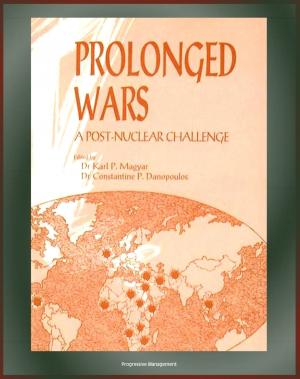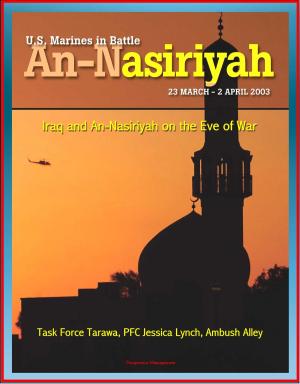Drone Wars, Strikes and Targeted Killing of al Qaeda Terrorists: President Obama's Speech on Counterterrorism Strategy, Guantanamo, Hearings on Drone Policy Effectiveness and Constitutionality
Nonfiction, Social & Cultural Studies, Political Science| Author: | Progressive Management | ISBN: | 9781301033997 |
| Publisher: | Progressive Management | Publication: | May 24, 2013 |
| Imprint: | Smashwords Edition | Language: | English |
| Author: | Progressive Management |
| ISBN: | 9781301033997 |
| Publisher: | Progressive Management |
| Publication: | May 24, 2013 |
| Imprint: | Smashwords Edition |
| Language: | English |
This unique collection provides insight into the ongoing controversy about the use of drones to kill terrorists and enemy combatants. It contains the complete text of the speech given by President Barack Obama on May 23 about his new counterterrorism strategy, along with a fact sheet on the policy and the text of a background briefing by senior administration officials. Testimony before the Senate Committee on the Judiciary Subcommittee on the Constitution, Civil Rights and Human Rights hearing on "Drone Wars: The Constitutional and Counterterrorism Implications of Targeted Killing” discusses the legal and military aspects of targeted killing by drones.
Contents: Obama's Speech on Counterterrorism * Fact Sheet: The President’s May 23 Speech on Counterterrorism * Background Briefing by Senior Administration Officials on the President's Speech on Counterterrorism * Hearing before the Senate Committee on the Judiciary Subcommittee on the Constitution, Civil Rights and Human Rights - testimony by General James Cartwright, United States Marine Corp (Ret.), Washington, DC; Farea Al-Muslimi, Sana’a, Yemen; Peter Bergen, Director, National Security Studies Program, New America Foundation, Washington, DC; Rosa Brooks, Professor of Law, Georgetown University Law Center, Washington, DC; Colonel Martha McSally, United States Air Force (Ret.), Tucson, AZ; Ilya Somin, Professor of Law, George Mason University School of Law, Arlington, VA * Bonus: Next Generation Air Transportation System - Unmanned Aircraft Systems Research, Development and Demonstration Roadmap.
In the background briefing, Obama Administration officials stated:
America does not take strikes to punish individuals; we only take action against terrorists who pose a continuing and imminent threat to the American people, and when there are no other governments capable of effectively addressing the threat. And, importantly, before any strike is taken, there must a near-certainty that no civilians will be killed or injured in the strike, which is the highest standard that we can set for avoiding civilian casualties.
So those are the types of standards that he’ll be addressing. He’ll also discuss at length the various tradeoffs and questions that he wrestles with and that our government has wrestled with in using lethal force abroad as it relates to efforts to prevent civilian casualties. And I think you will hear him make a very strong case that the use of targeted action is preferable to large-scale military deployments, to other types of more indiscriminate air power. and, of course, to permitting terrorist attacks that could be prevented to take place.
As a part of his discussion, he will address the declassification that he authorized this week of the four instances in which U.S. citizens have been killed in U.S. lethal action -- sorry -- U.S. counterterrorism operations abroad. He will make clear that, in the instance in which a U.S. citizen was targeted, Anwar Awlaki, there was a very careful review both by the Department of Justice and across the administration about the decision to take that strike, while also making clear that Congress was fully briefed on that action before it took place.
And he’ll also make clear in that context that the standards that we apply for taking lethal action abroad are uniform for all people -- American citizens and other terrorist targets.
He will discuss the importance of oversight, including how we’ve been committed to congressional oversight. He will also indicate that he is open to and has asked his administration to review the possibility of additional oversight of lethal actions outside of warzones that goes beyond Congress.
This unique collection provides insight into the ongoing controversy about the use of drones to kill terrorists and enemy combatants. It contains the complete text of the speech given by President Barack Obama on May 23 about his new counterterrorism strategy, along with a fact sheet on the policy and the text of a background briefing by senior administration officials. Testimony before the Senate Committee on the Judiciary Subcommittee on the Constitution, Civil Rights and Human Rights hearing on "Drone Wars: The Constitutional and Counterterrorism Implications of Targeted Killing” discusses the legal and military aspects of targeted killing by drones.
Contents: Obama's Speech on Counterterrorism * Fact Sheet: The President’s May 23 Speech on Counterterrorism * Background Briefing by Senior Administration Officials on the President's Speech on Counterterrorism * Hearing before the Senate Committee on the Judiciary Subcommittee on the Constitution, Civil Rights and Human Rights - testimony by General James Cartwright, United States Marine Corp (Ret.), Washington, DC; Farea Al-Muslimi, Sana’a, Yemen; Peter Bergen, Director, National Security Studies Program, New America Foundation, Washington, DC; Rosa Brooks, Professor of Law, Georgetown University Law Center, Washington, DC; Colonel Martha McSally, United States Air Force (Ret.), Tucson, AZ; Ilya Somin, Professor of Law, George Mason University School of Law, Arlington, VA * Bonus: Next Generation Air Transportation System - Unmanned Aircraft Systems Research, Development and Demonstration Roadmap.
In the background briefing, Obama Administration officials stated:
America does not take strikes to punish individuals; we only take action against terrorists who pose a continuing and imminent threat to the American people, and when there are no other governments capable of effectively addressing the threat. And, importantly, before any strike is taken, there must a near-certainty that no civilians will be killed or injured in the strike, which is the highest standard that we can set for avoiding civilian casualties.
So those are the types of standards that he’ll be addressing. He’ll also discuss at length the various tradeoffs and questions that he wrestles with and that our government has wrestled with in using lethal force abroad as it relates to efforts to prevent civilian casualties. And I think you will hear him make a very strong case that the use of targeted action is preferable to large-scale military deployments, to other types of more indiscriminate air power. and, of course, to permitting terrorist attacks that could be prevented to take place.
As a part of his discussion, he will address the declassification that he authorized this week of the four instances in which U.S. citizens have been killed in U.S. lethal action -- sorry -- U.S. counterterrorism operations abroad. He will make clear that, in the instance in which a U.S. citizen was targeted, Anwar Awlaki, there was a very careful review both by the Department of Justice and across the administration about the decision to take that strike, while also making clear that Congress was fully briefed on that action before it took place.
And he’ll also make clear in that context that the standards that we apply for taking lethal action abroad are uniform for all people -- American citizens and other terrorist targets.
He will discuss the importance of oversight, including how we’ve been committed to congressional oversight. He will also indicate that he is open to and has asked his administration to review the possibility of additional oversight of lethal actions outside of warzones that goes beyond Congress.















